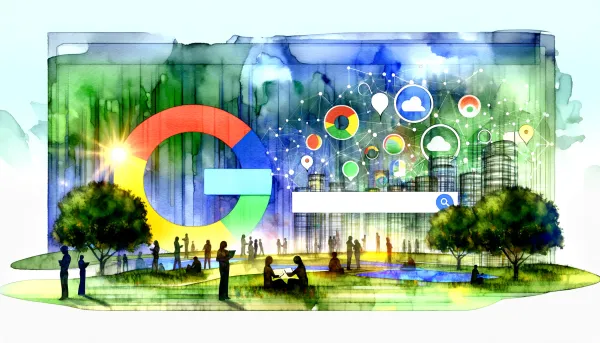Podcast Recording: SEO in 2021 and Years to Come

Every year I use this time to take a look at things from perspective. Recap what happened last year and how that fits into the bigger picture.
And I figured that I could share my thoughts with you on top of the usual SEO Rewinds.
And because I love learning and experimenting with new things, I decided to record this as a podcast. Audio is much better for this more personal content.
But I’m still new to this so any feedback is highly appreciated.
What happened in 2020 in SEO?
First, we need to take a look at last year. So, what happened in SEO in 2020? Well, actually not much. For a couple of years already, SEO has been an established thing. Sad to say, it's not that sexy anymore.
But still, we can see a couple of main themes of 2020 SEO that are worth highlighting.
Experiments with machine learning
The first theme is machine learning and using some sort of AI for SEO. More and more SEOs are experimenting with different data science tools and trying to figure out if they can use them to make SEO improvements at scale.
More than ever, I see people learning Python, experimenting with Google Colab and playing with advanced algorithms.
If you want to step up your game in 2021, getting the hang of these skills may be a wise thing to do.
If you need some resources, a good place to begin is Search Engine Land which has a couple of well-written guides that will give you a head start. Two of these are written by Hamlet Batista — the first one is called “A Practical Introduction to Machine Learning for SEO Professionals” and the other is called “How to Produce Quality Titles & Meta Descriptions Automatically”.
Of course, you’ll find all links in the footnotes. And both articles contain links to other resources that you can explore.
Another article worth mentioning happens to be on Search Engine Land as well. What a great resource. This one written by Mike King, and it’s called “How to Generate Data-Driven Copy for Ecommerce Category Pages with GPT-2”.
SEO tools are more accessible
It is true that using machine learning and programming skills in SEO is very advanced stuff.
But at the same time we can see that SEO is becoming more and more accessible and easier to start with. And that’s the second theme of 2020.
A plenty of free tools were introduced in 2020. You can actually create yourself a decent setup using just free tools. If you combine Ahrefs Webmaster Tools with Google Search Console and perhaps Greenflare — the recently introduced free SEO web crawler, it’ll be good enough for many use cases. And you can even add Microsoft Clarity to your toolbox, the free alternative to Hotjar by Microsoft, or the recently updated Bing Webmaster Tools with is free as well. And these tools are not that hard to master. They will guide you to find the most important issues that your site has.
And the paid tools we use for SEO daily have made great progress as well. If you look at tools such as Sitebulb or Screaming Frog, the number of changes that were implemented during the last year is astonishing, making our work so much efficient.
Google Discover
The third and last thing that I have on my list for 2020 are experiments with Google Discover. Google Discover is available on Android phones and on iOS in the Google App. It recommends you content not based on keywords, but based on your interests and browsing history. You can see how many visitors you get from Discover in your Google Search Console.
According to Google, more than 800 million people use Google Discover each month. And when I look into Google Search Console, I see that some sites indeed get quite significant traffic from Google Discover.
But so far, I haven’t seen any concrete advice on how to optimize for it. Apart from the usual generic advice to produce “outstanding and engaging content”.
I did several tests last year, but to me, this is the unsolved mystery of 2020 because I have no clue how to optimize for it yet. But I will definitely continue to experiment with it!
And that brings us to 2021.
What I think 2021 will look like in SEO?
What’s going to happen in SEO?
There are the small things what we know about in advance. Like the switch to mobile-first indexing for all sites that will happen in March 2021. And believe it or not, there are still sites that are crawled primarily using the desktop crawler.
One thing that will probably make most of the headlines is Core Web Vitals. In May 2021 Core Web Vitals will become an official ranking signal as part of the page experience ranking signals. So, we’ll hear a lot about page speed optimization.
Will it have significant impact on your business? Probably not.
Honestly, same as last year, I don’t see any major changes coming this year either.
In SEO, we are in a stage where we should focus on the long-term trends rather than the daily noise.
So with that in mind I’d like to highlight three trends that are gradually creeping in, and I think you should give them some thought in 2021.
Less control over your presence in SERPs
The first trend is that we are gradually losing control over our presence in search.
Portent last year conducted a study on how Google uses meta descriptions in search results. They found out that Google rewrites about 70% of meta descriptions.
In roughly 70% of cases, Google will pick an automatically generated snippet from page content rather than the meta description that you wrote for that page.
You probably know that Google has been tweaking titles for some time already. In featured snippets they combine text from one source with images from a different site to build the best user experience.
And all that is only natural. One page can rank for thousands and thousands of keywords, it would be stupid to think that the description you wrote is the best match for every single query, right?
Are we okay if, at some point, Google let’s say takes our content and creates an auto-generated summary out of it?
Is this good or bad? I guess I’ll let you to be the judge.
Focus on diversity of visibility opportunities
The second trend is that Google’s universal search is getting more and more competitive, prioritizing big brands, and we need to increase our focus on other search experiences and search engines rather than only Google’s universal search.
As SEOs, we tend to be too obsessed with Google’s universal search. And don’t get me wrong it is super important indeed. But in many cases, rather than focusing on the highly competitive universal search, you should focus on things such as Image Search, local SEO for Google Maps and the local pack or YouTube SEO for video. Even Pinterest is still relevant in some niches. And we already talked about Google Discover today.
We need to take a broader look at where our audience is, how they search online and prioritize accordingly.
In 2021, we need to go beyond Google Universal and broaden our horizons otherwise we may stay behind.
Focus on closed web
The third and the last thing I wanted to talk about is a slow transition from the open web to the web that is closed and controlled.
And this one makes me quite sad.
In the early days of the World Wide Web, it was more like a wild wild west. Everyone was independent. Everyone was building their own thing.
We used to have discussion forums, self-hosted on platforms such as phpBB, which are now pretty much gone and replaced with Facebook Groups.
We used to have organic search results with just ten blue links, now we have rich results with things such as featured snippets that provide answers even before you visit a website.
As a matter of fact, many restaurants and small businesses are okay with only having a Facebook page or Instagram profile. It’s easier to update than a typical website… and all communication with customers is happening on Facebook anyway so why should they bother?
But of course, this comes with a price. We don’t want to be dependent on large platforms such Google, Facebook, Amazon.
We want to build our equity in things that we own and control.
A great example of this is how YouTube has changed over the years. Originally, it was a very liberal open-minded platform. And if you are a video creator, it can give a ton of visibility to your content.
Slowly over time and as the platform grew, more stringent rules were introduced. With an AI reviewing all uploaded videos and automatically deleting or demonetizing videos that seem to violate the rules. This in many cases results in YouTube creators losing income or losing their whole channel for minor offenses or no reason at all.
You don’t want to make your business dependent on a platform that — in case of troubles — tells you that you can sort it out with their… chatbot.
On the individual level each one of us can make our own choice, knowing what the pros and cons are.
But in SEO consulting it can pose a dilemma when you give advice to clients.
A rule of thumb in SEO has always been that you need to do that Google tells you, align your strategy with Google, and it’ll work best. But it can make the dependance on Google more significant and be bad in the long run. Should we optimize for Featured Snippets? Should we implement AMP? Web Stories? As consultants should we recommend the path of less resistance or the more difficult yet independent way?
That’s something to think about in 2021.
Well, that was it… from 2020 we have
- machine learning in SEO
- Tools and SEO in general becoming more accessible
- and my experiments and fails with Google Discover
And for 2021 and beyond we talked about
- having less control over our presence in SERPs
- organic search becoming more and more competitive and the need to focus elsewhere
- and the slow transition to the closed web.
Let me know what you think about years to come and SEO. Do you agree or do you see some things differently.
Let me know and once again happy new year.
Footnotes:
- https://www.searchenginejournal.com/machine-learning-practical-introduction-seo-professionals/366304/
- https://www.searchenginejournal.com/titles-meta-descriptions-automatically-python-javascript/360108/
- https://www.searchenginejournal.com/generate-data-driven-copy-ecommerce-category-pages-gpt-2/375277/
- https://ahrefs.com/webmaster-tools
- https://greenflare.io
- https://clarity.microsoft.com
- https://www.bing.com/toolbox/webmaster/





